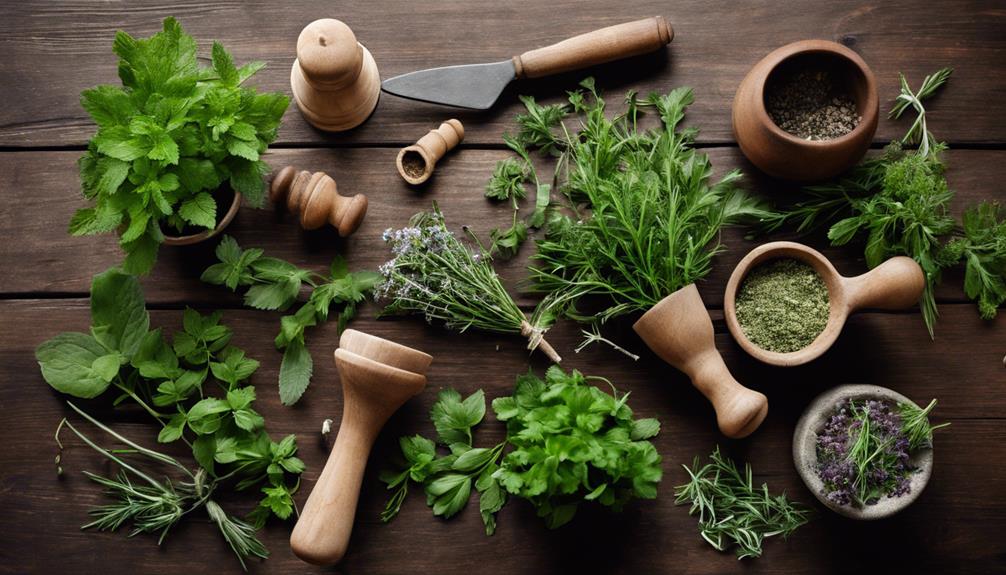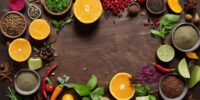Herbal Medicine for Beginners by Katja Swift & Ryn Midura – Summary and Review

'Herbal Medicine for Beginners' by Katja Swift & Ryn Midura delves into the healing power of plants. It offers essential knowledge for herbal medicine enthusiasts. This book bridges ancient traditions with modern holistic practices, fostering a deeper connection with nature's remedies.
Key Takeaways
- Start with high-quality herbs and record your journey in a journal for personalized herbal remedies.
- Connect with the herbalist community for guidance and support on crafting effective herbal solutions.
- Experiment with different herbs and preparations to tailor remedies for specific needs and enhance well-being.
- Embrace curiosity, question traditional beliefs, and seek reliable resources to maximize your herbal medicine experience.
Authors' Background and Expertise
The authors of 'Herbal Medicine for Beginners' bring a wealth of knowledge and experience to the field of herbal remedies. Katja Swift and Ryn Midura are renowned herbalists who've dedicated their lives to studying and practicing herbal traditions. Their expertise in folk remedies is unparalleled, making them trusted authorities in the world of natural healing.
Swift and Midura's deep-rooted understanding of herbal traditions stems from years of hands-on experience working with various plants and remedies. They've honed their craft through extensive research and practical application, allowing them to offer practical advice and effective solutions for common ailments.
Through their book, readers can benefit from the wisdom distilled from generations of healers and the latest scientific insights. Swift and Midura's passion for empowering individuals to take control of their health shines through in their writing, making 'Herbal Medicine for Beginners' a valuable resource for those seeking natural alternatives to conventional medicine.
Overview of Herbal Medicine Basics
With a foundation established in the authors' rich expertise, exploring the fundamental principles of herbal medicine reveals a world where nature's remedies intertwine with human well-being. Here are some key points to ponder:
- Herbal Preparation Techniques: Herbal medicine involves various preparation methods, such as decoctions, infusions, tinctures, and salves, each designed to extract and preserve the plant's beneficial properties effectively.
- Herbalism Misconceptions: Contrary to some beliefs, herbal medicine isn't just a form of alternative medicine but has been an essential part of human healing for centuries, offering a holistic approach to well-being.
- Nature's Wisdom: The use of plants for medicinal purposes connects individuals with the natural world, emphasizing the importance of sustainable practices and respect for the environment.
- Empowerment and Self-Care: Herbal medicine empowers individuals to take control of their health, promoting self-care and a deeper understanding of their bodies' needs.
Exploring Healing Properties of Plants
Within the domain of herbal medicine, the healing properties of plants offer a diverse array of benefits to those seeking natural remedies. Understanding the effectiveness of herbal remedies can provide valuable insights into how to harness the power of plants for health and wellness.
Exploring the healing potential of various plants opens up a world of possibilities for those interested in alternative and holistic approaches to healthcare.
Plant Healing Benefits
Exploring the intricate healing properties of plants discloses a natural world brimming with therapeutic potential waiting to be harnessed. Here are some benefits of plant healing:
- Plant Identification: The ability to identify different plants accurately is essential for harnessing their healing properties.
- Harvesting Techniques: Knowing the best time and method to harvest plants guarantees the potency of their medicinal qualities.
- Herbal Medicine History: Understanding the historical uses of plants in herbal medicine provides valuable insights into their efficacy.
- Modern Applications: Incorporating traditional plant-based remedies into modern healthcare practices showcases the continued relevance of herbal medicine.
Embracing the healing benefits of plants opens up a world of natural solutions for health and well-being.
Herbal Remedies Effectiveness
Revealing the efficacy of herbal remedies relies on a deep understanding of the healing properties inherent in plants. Separating herbal medicine myths from truths is important in appreciating the true potential of these remedies.
While some may dismiss herbal medicine as mere folklore, the reality is that many plants possess potent healing properties that have been utilized for centuries. However, recognizing that along with their benefits, herbal remedies also come with safety concerns.
Without proper knowledge and guidance, there's a risk of misuse or adverse reactions. When delving into the world of herbal medicine, approaching it with respect, understanding both its potential and limitations to ensure a safe and effective healing journey.
Crafting Your Own Herbal Remedies
How can one effectively craft their own herbal remedies at home?
Crafting herbal remedies can be a fulfilling and empowering experience. Here are some tips to get you started:
- Herbal Infusions: Begin by selecting dried herbs like chamomile or peppermint. Boil water and pour it over the herbs, allowing them to steep for about 10-15 minutes. Strain the liquid and enjoy a soothing herbal tea.
- Healing Salves: To create a healing salve, melt beeswax and mix it with infused herbal oil. Add essential oils like lavender for fragrance and additional healing properties. Pour the mixture into containers and let it cool to solidify.
- Labeling and Dating: Remember to label your creations with the ingredients used and the date of preparation. This will help you keep track of their potency and shelf life.
- Experimentation: Don't be afraid to experiment with different herbs and combinations to find what works best for you. Enjoy the process of creating your own herbal remedies tailored to your specific needs.
Integrating Herbs Into Daily Life
Herbs can be seamlessly woven into daily life by incorporating them into cooking. Enjoying herbal teas on a regular basis adds another dimension to this practice. Utilizing herbal remedies at home is another way to benefit from these natural remedies.
By infusing herbs into everyday routines, individuals can experience the benefits of these natural remedies in a simple and accessible manner.
Embracing herbs in various aspects of life can lead to a holistic approach to wellness and self-care.
Herbs for Cooking
Integrating a variety of herbs into your daily cooking routine can elevate the flavors of your dishes and enhance the overall dining experience. Here are four ways to make the most of culinary herbs and herbal recipes in your kitchen:
- Fresh Basil: Add a handful of fresh basil leaves to your pasta dishes or salads for a burst of aromatic flavor.
- Rosemary Roasted Potatoes: Toss diced potatoes with olive oil, minced rosemary, salt, and pepper before roasting for a delightful side dish.
- Minty Lemonade: Infuse a pitcher of lemonade with fresh mint leaves for a invigorating twist on a classic drink.
- Thyme-Infused Butter: Mix finely chopped thyme into softened butter, then spread it on warm bread for a savory treat.
Herbal Teas Daily
Elevating daily rituals with the nourishment of herbal teas can bring an invigorating and essential approach to integrating herbs into one's daily life. Herbal infusions offer a delightful way to experience the advantages of various herbs. By incorporating tea blends into your routine, you can create moments of tranquility and sustenance throughout the day.
Whether it's a soothing cup of chamomile before bed or a rejuvenating blend of peppermint and lemon balm in the morning, herbal teas provide a versatile and accessible way to introduce herbs into your lifestyle. Experiment with different combinations to discover flavors and effects that resonate with you.
Embracing herbal teas daily can't only enhance your well-being but also add a touch of mindfulness to your everyday experiences.
Herbal Remedies At-Home
Enhancing one's daily routines with the healing power of herbal remedies can cultivate a deeper connection to nature and wellness. By integrating DIY herbal blends into daily life, individuals can initiate on a journey of natural healing that brings harmony and essential.
Here are four ways to seamlessly incorporate herbal remedies at home:
- Start the day with a cup of homemade herbal tea to invigorate the senses.
- Create calming herbal sachets to place in your bedroom for a restful night's sleep.
- Infuse oils with healing herbs to use in massages or aromatherapy sessions.
- Experiment with herbal tinctures to address specific health concerns and boost overall well-being.
Embracing these practices can empower individuals to take charge of their health and well-being in a holistic and fulfilling manner.
Practical Tips for Beginners
For those just starting their journey into herbal medicine, practical tips can be invaluable in managing this ancient healing practice. Understanding herbal preparations and embracing holistic healing can greatly enhance your experience. Here are some essential tips to get you started on the right path:
| Tip 1: Explore | Tip 2: Begin Gradually |
|---|---|
| Explore books, online resources, and courses to expand your knowledge. | Begin with a few herbs and simple remedies to build confidence. |
| Tip 3: Quality Matters | Tip 4: Record Your Journey |
| Invest in high-quality herbs for better results. | Keep a journal of your experiments, successes, and failures for future reference. |
| Tip 5: Connect with Community | |
| Join herbalist groups, attend workshops, and seek mentorship for support and guidance. |
Final Thoughts and Recommendations
As one reflects on their herbal medicine journey, it becomes evident that embracing a mindset of curiosity and openness can lead to profound growth and understanding in this ancient healing art. Exploring the world of herbal medicine is a journey filled with wonder and discovery, where myths are debunked, and realities are revealed.
To make the most of this experience, beginners are encouraged to:
- Question Traditional Beliefs: Challenge conventional wisdom surrounding herbal medicine and explore new perspectives.
- Seek Reliable Resources: Consult trusted herbal medicine resources and guides to deepen knowledge and skills.
- Experiment and Learn: Embrace a hands-on approach by trying different herbs and remedies to understand their effects.
- Connect with Community: Engage with fellow herbal enthusiasts to share experiences, insights, and support on this enriching path.
Frequently Asked Questions
Are There Any Potential Risks or Side Effects Associated With Using Herbal Medicine as a Beginner?
When exploring herbal medicine as a beginner, there are potential risks to take into account. Proper dosage and quality control are essential. Look out for potential interactions and allergic reactions. It's wise to approach herbal remedies with caution.
How Can One Differentiate Between Reputable Sources of Information on Herbal Medicine and Unreliable Sources?
In evaluating sources on herbal medicine benefits, one must look for reputable websites with expert authors, scientific references, and a transparent editorial process. Unreliable sources often lack credibility, promote unproven claims, and lack transparency.
Is It Possible to Grow and Cultivate Your Own Herbs for Medicinal Purposes, and if So, What Are Some Beginner-Friendly Herbs to Start With?
Indoor gardening offers a sustainable way to cultivate herbs for DIY remedies and self-care. Beginners can start with easy-to-grow herbs like basil, peppermint, and chamomile. Growing your own medicinal herbs can be a rewarding journey.
Are There Any Specific Herbs or Remedies Recommended for Common Ailments Such as Headaches, Digestive Issues, or Stress?
For common ailments like headaches, digestive issues, and stress, herbal tea blends can offer relief. Chamomile calms, peppermint soothes, and ginger aids digestion. Aromatherapy benefits include lavender for stress, peppermint for headaches, and ginger for digestion.
How Can One Safely Store and Preserve Herbal Remedies for Future Use?
To properly store and preserve DIY remedies made from homegrown herbs, one must guarantee proper storage conditions like a cool, dark place. This helps maintain their potency and extend their shelf life, allowing for future use with maximum effectiveness.











